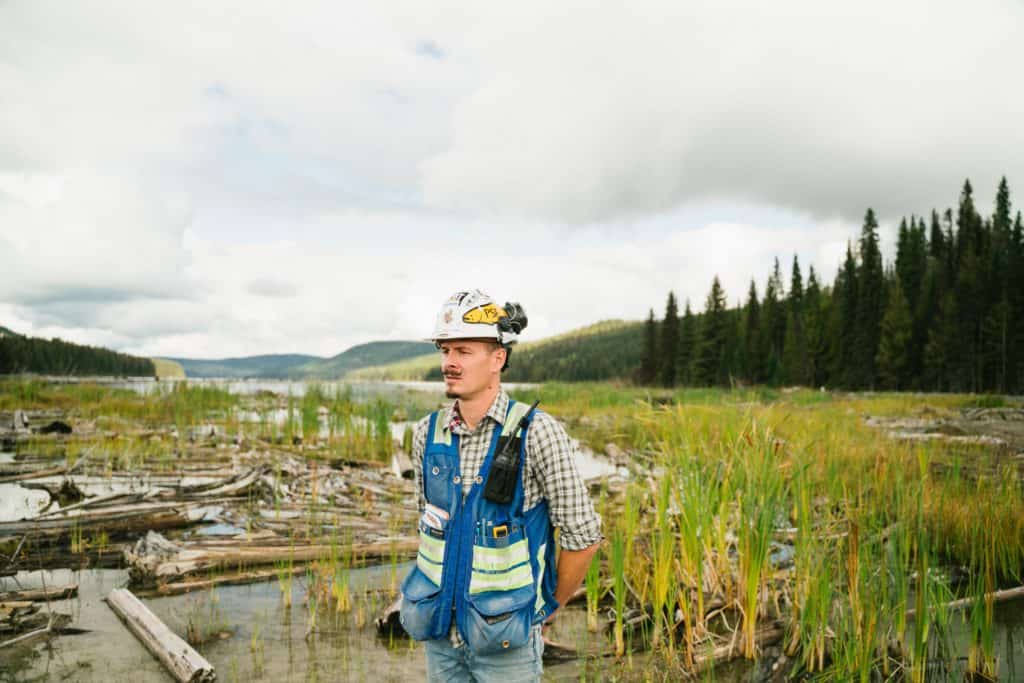On the global stage, environmental and sustainability management deals with managing the oceans, atmosphere, freshwater systems, and the earth’s land, according to the principles of sustainability. The curriculum of an Online Master’s in Environmental and Sustainability Management degree covers these issues from an interdisciplinary point of view. This flexible and convenient program equips distance learners to be able to apply sustainable development strategies and respond to the critical needs of an ecosystem.
The arena of environmental and sustainability management has become a significant focus of scientific research as the potentially catastrophic effects human communities and biodiversity is palpable. Ocean circulation patterns are a part of this type of science as they have proven to be a strong influence on weather and climate and, eventually, the food supply of humans and all of the earth’s organisms.
Land use evolution is fundamental to the operation and maintenance of the biosphere. Changes in the relative proportions of natural resources dedicated to urbanization, pasture, agriculture, grassland, forest, and woodland have a marked and exponential effect on the global carbon, nitrogen, and biogeochemical water cycles. Management of our planet’s atmosphere involves assessment and evaluation of all aspects of the carbon cycle to find opportunities to address and repair human-induced climate change.
The online master’s degree focuses on environmental problems and global development that have been recognized in many international agreements. Any online master’s worth its salt will also explore how to find solutions to these problems by promoting sustainable development within organizations. Graduate students within a high-quality environmental and sustainability program can expect the program to provide some practical research experience and room for reflection to promote sustainable development. The formulation of critical skills, analysis, and integration for sustainable development challenges and environmental resolution will also be a part of the program’s curriculum.
An educated expert in sustainable development can qualify for positions in government organizations and other public sector groups that are committed to policy analysis in the facets of sustainable development management of the environment. With factors like these in mind, here is a ranking of the top 25 best Online Master’s in Environmental and Sustainability Management degrees in the country.
Methodology
To find the top Online Master’s in Environmental and Sustainability Management programs, schools offering distance-based master’s degrees exploring topics in environment and sustainability were examined. These master’s degrees were ranked upon their reputation, convenience, and affordability.
Reputation
To find the overall reputation and prestige of each degree, data was combined from The Princeton Review, US News and World Report, and each school’s College Consensus Score. The data for each school was averaged and placed on a 100-point scale for the Reputation Score. This attributes to 33% of the final ranking score.
Convenience
The convenience of each online program is rooted in if the degree can be completed in 100% online, and if the admission’s test score requirement is waived or omitted (including GMAT and GRE). This score attributes to 33% of the final ranking score.
Affordability
The base tuition is calculated for the entirety of each degree, which does not include fees or books. All financial information was taken from each university’s website. The tuition was inverted and placed on a 100-point scale. This score attributes to 33% of the final ranking score.

The College of Natural Resources at the University of Idaho provides an online Master of Science in Environmental Science. A successful graduate of this degree will have completed 30 graduate-level credits spread out across the three concentration areas of physical, social, and biological science. Distance learners may choose a non-thesis option, which requires at least three credits in non-thesis research followed by 26 credits of course work. The thesis-based program includes at least six credits in thesis research followed by 26 credits of course work. Graduate students enrolled in this 100% online degree can expect to complete a substantial project in which they demonstrate an ability to do rigorous independent work at the location of their choosing. Flexibility and convenience are at the top of the list for the College of Natural Resources as students do not need to ever travel to the School’s campus in Moscow, Idaho. The tuition rate of well below $20,000 means that students will enjoy lots of bang for their academic buck.

Arizona State University offers an online Master of Sustainability Leadership at the School of Sustainability. Program architects have created this 30-credit hour degree to prepare professionals to advance environmental and social responsibility. The curriculum within the program equips students with organizational leadership skills through the filter of sustainability. This 100% online degree encourages distance learners to drive high-octane global sustainable results for their organizations, communities, and companies through their very careers. Graduates of this distance degree will be equipped to advance sustainability practices and strategically share sustainability as the highest standard for best institutional practices. Throughout this ten-course program, students will focus on strategy, communications, global context, and leadership. School of Sustainability leadership prices this degree at less than $20,000 and makes it possible for students to understand critical tools, knowledge, and approaches at the intersection of sustainability and leadership. The 30-credit hours are divided between six hours of electives, 18 hours of core courses, and six hours of a culminating experience.

The College of Agriculture, Health, and Natural Resources and the College of Liberal Arts and Sciences at the University of Connecticut offers an online Master of Energy and Environmental Management. This 30-credit hour program is hailed as a revolutionary online master’s degree that has been designed to empower UConn students with the information they need to make an impact immediately through the social benefits of direct real-world action. UConn’s environmental and energy management program takes a holistic approach while combining the knowledge and skills needed to enable students to produce tangible community-focused benefits through real-world applications. The MEEM offers an interdisciplinary perspective through classes centered on environmental law, geographic information systems, and planning and management. Divided between 27 credits of coursework and three credits of internship/practicum work, the entire program consists of 30-credit hours. The tuition of this degree sits is below $25,000.

An online Master of Sustainable Transportation is provided at the University of Washington’s College of Engineering. As urban populations continue to grow dramatically in the recent decades, the crucial need for sustainable transportation systems continues to expand. Communities all over the world must now be responsible for a range of complex factors in their land-use planning and transportation paradigm. Factors of this stellar 43-credit hour program include mass transit, alternative energies, economic development, climate change, livable communities, and population density. The 100% online UW Master of Sustainable Transportation readies online students to take on these issues through the interdisciplinary study of critical subjects in transportation policy, planning, and analysis. The UW Department of Civil & Environmental Engineering provides this degree within the College of Engineering. The tuition rate for this online degree falls at just over $30,000. A capstone project that lasts one year is part of the degree’s curriculum. Most graduate students will take three years to satisfy all program requirements.

The College of Engineering Technology at the Rochester Institute of Technology offers an online Master of Science in Environmental Health and Safety Management. Course instructors understand how the management of safety, environmental, and health issues has changed significantly over the past two decades. Today’s emergence of voluntary standards, codes of conduct, and international standards, coupled with the limited resources and need to manage costs, has resulted in the trending beyond regulatory compliance. Organizations now work toward sustainability through the understanding and application of integrated safety, environmental, and health management systems, which are worked into crucial business processes. The 100% online MS program in environmental, health, and safety management offers distance learners a solid foundation in the business and managerial aspects of developing and executing environmental, safety, and health management systems. These practices will move organizations forward to a more sustainable and ethically responsible future. Besides, graduate students will gain a solid technical foundation in air emissions, occupational health, wastewater, and solid and hazardous waste. Elements of sustainability are woven into most of the core courses and electives.

An online Master of Science in Environmental Policy and Management with a concentration in Energy and Sustainability is currently available at the University College at the University of Denver. Program designers encourage graduate students to take on the varied environmental issues of our time and develop sustainable and practical solutions. The current shifting energy landscape brings sustainability issues to the forefront, and through this 48-credit hour program, a working professional can become an informed advocate for the utilization of sustainable practices. Enrolled students will learn how energy sources are financed, developed, leveraged, and regulated while observing and evaluating trends in energy. The result will be a distance learner who is capable of cultivating sound environmental policies. The tuition of this online Master of Science in Environmental Policy and Management with a concentration in Energy and Sustainability is just less than $35,000. The University College does not list a GMAT or GRE score submission in its acceptance process instructions.

An online Master’s of Sustainable Engineering is provided at the College of Engineering at Villanova University. Featuring a tuition rate of less than $45,000, the 30-credit hour program at Villanova is one of only a few such programs in the United States. This 100% online Sustainable Engineering graduate program is designed to prepare students to utilize a whole-systems approach to creative thinking through a lifecycle lens. Program architects have fashioned a degree ideal for those working professionals interested in gaining further knowledge and expertise in the environmental, economic, and social aspects of sustainable engineering. Engineers, as well as the non-engineering degree holders, are welcomed to apply to this high-octane program. Interdisciplinary in Nature, the College of Engineering’s master’s degree weaves theory, case studies, assignments, and guest lectures with ample team project experience. The program’s core courses also utilize interactive, critical thinking experiences that build a student’s awareness and allow her to gain a better appreciation of the STEEP (social, technological, environmental, economical, and political) issues that surround most processes, product, and system views.

An online Master of Science in Environmental Planning and Management is offered at Johns Hopkins University’s Whiting School of Engineering. The curriculum for this exciting distance degree at Johns Hopkins Engineering for Professionals shows how science and environmental engineering affect real-world outcomes in the economy, public policy, and decision-making. Program designers have taken into account the factors of modern technology, the availability of financial resources, and social constraints. Each course is taught by an experienced instructor using interactive learning tools through online course delivery. Students are taught how to plan, execute, and evaluate the many complex environmental projects of our time. Graduates of this 100% online program will be able to demonstrate a fundamental knowledge of concepts and problems relevant to climate change and environmental sustainability. Students will also be able to solve quantitative issues and make technical assessments that are relevant to environmental sustainability, green technologies, and climate change science. Johns Hopkins makes this degree available for just over $45,000 in tuition.

The College of the Coast & Environment at Louisiana State University currently provides an online Master of Science in Environmental Sciences. LSU’s Department of Environmental Sciences utilizes multidisciplinary scientific approaches to comprehend complex interactions between natural and social systems. The ENVS body of researchers and instructors are experts in a wide variety of soil, social, aquatic, plant, and atmospheric sciences. Air, water, and soil quality monitoring, remote sensing, environmental management, environmental health & bioremediation of toxic and hazardous substances, geographic information science, ecological & genetic toxicology, environmental law & policy, resource sustainability, and decision making, and environmental communications are just some of the areas of expertise graduate students of the online Master of Science in Environmental Sciences will be exposed to. The three broad categories that create the degree’s traditional scientific disciplines include environmental assessment and analysis, environmental planning and management, and biophysical systems. The tuition amount advertised for this program is less than $20,000.

The University of Vermont provides an online Masters of Professional Studies in Leadership for Sustainability at the Rubenstein School of Environment and Natural Resources. Designed for experienced and emerging leaders, this stellar 30-credit hour degree has been designed to explore leadership practices which are inspired by the wisdom of Nature. This 24-month program offers an innovative blend of residential intensives which take place in Vermont, California, and Durham, and North Carolina, with interactive online instruction, professional coaching, and a top-notch network of faculty and professional associates. At the heart of the program is a dedication to cultivating an equitable and diverse learning ecosystem. The ten-course core curriculum and innovative pedagogy are rooted in the belief that the changes created in the world are reflective of the conditions and changes we cultivate in ourselves. Learning Goals of the degree include deepening relationships with ecological systems and processes, shifting inequitable systems and structures of power, and creating conditions of sustainable living.

The College of Public Affairs and Administration at the University of Illinois at Springfield features an online Master of Science in Environmental Sciences. The curriculum for this excellent online MS in Environmental Sciences offers students the chance to gain a robust scientific understanding of the ways of studying, evaluating, and interpreting environmental realities and their impacts. Graduate students will be challenged to mitigate and manage environmental issues. Objectives of the degree include encouraging students to develop basic literacy in the social and natural sciences and the humanities as they make an impact through the understanding and adaptability of environmental issues, critically analyzing ecological struggles, and identifying, researching, and evaluating environmental problems. Graduates of this 100% online degree will be able to compare, contrast, manage, and implement short- and long-term solutions regarding issues in the environment. The department suggests that incoming students interested in the Environmental Sciences program have prior knowledge of biology, chemistry, algebra, and statistics. The tuition rate for the program is less than $15,000.

The College of Natural Resources and Environment at Virginia Polytechnic Institute and State University offers an online Master of Natural Resources. Listed as a 30-credit degree, this flexible program has been designed to prepare students for careers in environmental sustainability. The program is hybrid as it combines online coursework with participation in a face-to-face Global Study international trip that lasts ten days. This experience takes the place of the usual graduate degree capstone project. Breaming with critical thinking training, this interdisciplinary program instills the conceptual skills necessary for career development and lifelong learning. College of Natural Resources and Environment graduates are prepared to succeed on the global stage as sustainability, natural resource, and environmental professionals. Expectant and recent undergraduate students are encouraged to apply to the Online MNR that consists of ten courses. Many graduate students are working professionals who are exposed to the modern workspace comprised of distributed and virtual teams daily. Constantly forming professional networks at a distance, these students apply the same approach to their online graduate programs. The program is set between $25,000 and $30,000 and designed to offer distance learners many opportunities to network, both in-person and online.

The Extension School at Harvard University provides an online Master of Liberal Arts, Sustainability. Graduate students wanting to gain an excellent insight into the critical environmental factors that affect air, water, climate, and ecosystems will want to research this hybrid degree. In this master’s program in sustainability, students will learn to evaluate and design systems, practices, and technologies that bring sustainable solutions to organizations and communities. Many of this program’s courses can be taken online, but students are required to come to Cambridge for at least one class. The thesis proposal and capstone course each offers graduate students crucial in-person access to staff, campus resources, and the academic community at large. Harvard lists no GMAT or GRE test scores needed during the application process, and the tuition rate sits right at $35,000. Graduate students can expect to concentrate their studies in one of five sustainability fields, including natural resource management, corporate sustainability, sustainable cities and communities, sustainable food systems, and environmental policy and international development.

An online MS in Sustainable Management is currently available at the Extended Campus of the University of Wisconsin. The university’s Extended Campus includes a partnership of UW Extended Campus and UW-Green Bay, UW-Oshkosh, UW-Parkside, UW-Stout, and UW-Superior. Program designers have crafted this online degree as an ideal choice for working professionals of all ages and backgrounds who require advanced education and wanting the flexibility an online program provides. Graduate students with a variety of work, life, and education experience have found incredible success in the program and are currently making a difference in the business world. The 100% online program consists of 12 courses and 34 credits. The curriculum speaks into the changing relationship of humans to the built and natural environment. Topics like scientific perspectives, economic systems, modeling techniques to evaluate business scenarios, the carbon cycle, public policy and law from both international and national perspectives, and how to impact effective change, which can take a group to the forefront of sustainability, are also explained in detail throughout the degree. The capstone course is usually taken during the final semester and provides students with an opportunity to head up a project in a real-world scenario.

Webster University offers an online MS in Environmental Management at the College of Arts and Sciences. The School’s online program in environmental management has been designed to provide graduate students with the techniques and tools they will need to navigate the business areas of environmental management. Distance learners will learn to assess and communicate the business, legal, and ethical information to those who create or are affected by the leadership decisions that shape natural resources and the environment. Course professors will apply key terminology, theories, facts, concepts, principles, and historical perspectives within global sustainability and environmental management toward solving environmental challenges. Stress on aligning sustainability initiatives in an organization’s mission and core values, managing environmental-related risk in an organization’s operation, and identifying environmental hazards that affect air, water, and soil quality are all included in the curriculum of this 30-33-credit hour program. An attractive tuition rate of well below $15,000 is advertised with this most-affordable program.

The Dale Bumpers College of Agricultural, Food and Life Sciences at the University of Arkansas provides an online MS in Human Environmental Sciences. This degree provides students with a myriad of diverse options that will prepare them for advanced careers in multifaceted fields. The programs offer online students three concentrations, including Apparel Merchandising and Product Development, Human Development and Family Sciences, and General Human Environmental Sciences. The Apparel Merchandising and Product Development focus offers advanced studies in quality assurance, brand management, product development, retail buying, and merchandising. The Human Development and Family Sciences concentration focuses on gerontology through the GP*IDEA consortia and includes a multidisciplinary curriculum on the aging process from middle age through later life. The General Human Environmental Sciences gives distance learners an advanced interdisciplinary degree for diverse careers, including community service occupations and international programs. The 100% online General Human Environmental Sciences emphasis takes a multidisciplinary approach, combining elements of other HESC specializations for graduates to obtain the problem-solving skills they will need to become professionals in the field.

The College of Architecture & the Built Environment at Thomas Jefferson University delivers an online Master of Science in Sustainable Design. The College’s two-year part-time online MS in Sustainable Design provides many of the same programs and courses as the campus-based degree but with the added flexibility and convenience of a 100% online course structure. Distance learners will take two different graduate certifications and then complete their capstone experience to achieve a master’s degree. The College’s “premium” course delivery methods will all but guarantee that graduate students will have ample opportunity for quality live interactions with the instructors, professors, and students in the program. Scholarships are readily available to qualifying candidates. The tuition rate of Thomas Jefferson University’s online degree sits just below $40,000. Each of the program’s courses features live discussions and lectures taught in real-time using video conferencing software. All live discussions and lectures are also recorded so that graduate students with other commitments can still complete the coursework at their leisure.

An online MS in Management and Organization with a Specialization in Managing for Sustainability is available at the Business School at the University of Colorado Denver. Program designers have created this degree to prepare distance learners for leadership roles in both private and public sector organizations. Business School students are professionals who can inspire themselves to become reliable leaders who are ready to make big decisions in business. Graduate students are encouraged to dive deep into one of the concentrations that allow them to tailor their degree or customize the program to fit their specific needs. The 30-credit hour can be approached from a full-time and part-time perspective based on the student’s professional and personal obligations. There are three start times each year, so distance learners can start in the Fall, Spring, or Summer. The business school’s top-ranked staff leads the field in their research. Specializations are offered to tailor this degree to a graduate student’s needs. Managing for Sustainability, Strategic Management, and the General Track are all provided by the University of Colorado Denver.

Tuskegee University’s College of Agriculture, Environment & Nutrition Sciences offers an online Master of Science in Environmental Management. The department currently offers two graduate programs in the Environmental Sciences area. The Master of Science in Environmental Sciences with a thesis requirement is delivered as a residential only option. A non-thesis option of residential or online is also available. The Master of Science in Environmental Management is another non-thesis degree that is only offered as a 100% online format. Graduate students are expected to complete a total of 30 credit hours, including research or professional project. Distance learners interested in graduate work within the areas of management and environmental sciences, including natural resources, can opt for a specialty area such as climate change, nutrient and ecosystem management, watershed management, soil health, ecological health, and fate and transport of environmental toxicants. Tuskegee’s 30-credit hour program is attractively priced at just over $20,000. Graduate students are encouraged to submit a GRE or GMAT score to the admission office as part of the acceptance process.

The Graduate Studies Department at Black Hills State University features an online Master of Science in Sustainability. Featuring 33-credit hours of high-octane learning, this program is delivered entirely online. Program architects have crafted the degree to inform students about practical and theoretical issues relevant to sustainability. Enrolled students can expect to be prepared for problems, communicating with stakeholders, and be trained in how to implement real-world solutions in their careers towards a sustainable society. The innovative and interdisciplinary degree is formatted as a 33-credit hour distance program. It provides graduate students with skills and knowledge that enable understanding of the intricate relationship between policy options, environmental factors, natural systems, socio-political forces, economic structures, and legal frameworks. A working relationship between the challenges and solutions relevant to a sustainable future depends on these general ideas. With a tuition rate of just over $15,000, this 100% online degree is a bargain and one of the most affordable programs within this ranking.

Montclair State University provides an online Master of Science in Sustainability Science with a concentration in Sustainability Leadership at the College of Science and Mathematics. The 100% online graduate program has been designed to satisfy a management need for private-sector companies, governmental agencies, and non-profit organizations. Graduate students enrolled in this program will pursue advanced learning in sustainability science, while also developing valued business skills. The Professional Science Master’s in Sustainability Leadership is perfect for distance learners interested in developing analytical skills and the chance to seek optimal solutions within complex issues. Online coursework emphasizes the development of critical oral and written communication skills, managing multiple tasks, the ability to develop strategic vision within sustainability, and the crucial skills of translating sustainability science theory into applied critical thinking. The 32-33 credit hour, cohort-based degree emphasizes the development of collaborative skills across time zones. In addition to the online Sustainability Science, Sustainability Leadership Concentration, the department also features a Sustainability Science, Sustainability Science, Sustainability Leadership Concentration, and Sustainability Science program.

The School of Public Policy at the Georgia Institute of Technology features an online Master of Sustainable Energy and Environmental Management. The 30-credit hour curriculum is a multidisciplinary degree featuring courses delivered in schools across the Georgia Tech campus. The Public Policy, Business, Economics, Industrial and Systems Engineering, Civil and Environmental Engineering, and City and Regional Planning schools all combine to offer this stellar 100% online graduate degree in Sustainable Energy and Environmental Management. The degree features a convenient 30-credit format, allowing students to take courses on a part-time basis. Graduate students in the area of Atlanta may choose to take some courses on-campus while others can take advantage of the distance learning options. Courses included in the degree are Sustainable Energy and Environmental Management, Economics of Environmental Policy, Climate Policy, Energy Policy and Markets, Earth Systems, and Energy Technology and Policy. Students also have the option to take advantage of an internship in the United States after the program or completing a professional paper at Georgia Tech in a study abroad program.

The College of Design, Construction, and Planning at the University of Florida delivers an online Masters of Science in Sustainable Design. The three-semester graduate degree program in Sustainable Design gives distance learners the interdisciplinary knowledge, confidence, and skills they will need to be a leader in the Sustainability Revolution. Rooted in a 36-credit hour format, the program features a curriculum delivered by core faculty from each of the College’s programs including, architecture, urban & regional planning, building construction, interior design, and landscape architecture. Students may choose between a short residency online format or a traditional on-campus structure. Sustainability in the design, building, and planning of the built environment is the connecting link between all of the professional programs in the College of Design, Construction, and Planning. The School is recognized nationally and internationally as one of the nation’s leading public institutions that provides consulting in sustainability. The College’s MSD program harnesses the diverse and robust expertise of its faculty around a common objective. This exemplary online degree can be pursued for less than $30,000 in tuition.

The Nicholas School of the Environment at Duke University features an online Master of Environmental Management. Duke’s high-quality Environmental Leadership Master of Environmental Management offers mid-career working professionals the real-world, interdisciplinary knowledge and skills they require to advance their careers and accelerate their leadership journey. Through group and individual coursework and a master’s project, distance learners will deepen their knowledge of core concepts in leadership and environmental management while tackling real-life case studies that are related to their current professions. Students enrolled in this hybrid online degree can expect a relevant curriculum that incorporates real-life case studies with problems and solutions directly relatable to their current job. The School takes a multidisciplinary approach that provides insights into many areas of environmental issues by utilizing Duke’s wide range of resources and expertise. There is no GMAT or GRE requirement associated with this degree, and the tuition rate is between $80,000 and $85,000.

An online Master of Science degree in Agriculture and Natural Resources is delivered by the College of Agriculture and Applied Science at the University of Tennessee at Martin. The MSANR curriculum has been formed into a 36-credit hour graduate program and is offered exclusively through distance learning. The tuition for this program is between $20,000 and $25,000. Students can choose from three concentrations that consist of 18 hours each. Agribusiness & Risk Management, Natural Resources Systems Management, and Systems Science in Agriculture will all bolster a graduate student’s understanding of this exciting field of business leadership. The 100% online degree program is designed to meet the current and future needs of place-bound Natural Resources and Agricultural professionals. The Agribusiness and Risk Management focus offers a range of agricultural economics classes explicitly developed to teach students about the risk management issues surrounding agribusiness enterprises. Courses like Advanced Agricultural Marketing, Commodity Futures and Options Markets, and Agricultural Risk Analysis and Decision Making are included in this specialization.
What is Environmental and Sustainability Management?
The world of sustainability and environmentalism is a fascinating topic when considering pursuing a graduate degree in the sector. Maybe you are interested in going back to school to attain a graduate degree in management but want to make a conscious effort to raise awareness for our social and environmental responsibilities. Thankfully, today, many excellent engineering and business schools feature online Master’s in Environmental and Sustainability Management. Graduate students interested in this field of study will be wise to research some of the different opportunities available to them after completing this type of degree.
Many will tell you in business that in our modern times, there is no static career path for positions in sustainability management. As such, the environmental and sustainability field is somewhat hard to define. The first question to answer is, why would a business professional seek to pursue an online sustainability management degree?
Workers from all different walks of life may have an interest in the topics of how we can conserve and protect our natural resources. A government electrician may be able to spot ways to reduce waste and operation costs while on base. At the same time, a manufacturing employee who experienced his auto plant flood with coolant might come up with a creative solution to an ecological problem. These are the types of people earning online sustainable management graduate degrees from some of the best colleges and universities across the country.
Students within these distance programs have some things in common. They want to continue to move their careers forward and make a real difference in the global landscape. A sustainable business program offers distance learner two things: a robust education with a flexible schedule and the addition of valuable skills in environmental science. Graduates of these programs stand out from the pack in business leadership.
Many sustainable management classes cover the topics one would be exposed to in a typical business degree program like those centered on issues like accounting, strategic management, marketing, and economics. However, the curriculum also covers subjects like systems thinking, environmental science and policy, ecology, and natural resource management. Graduates of an online business sustainability degree are equipped with a full range of useful skills that can be applied to virtually any position.
What Types of Jobs Would I be Qualified for with an Online Master’s in Environmental and Sustainability Management?
Careers that Sustainable Management graduates are pursuing span the spectrum in all types of organizations. These positions include Sustainability Specialist, Climate Change Analyst, Supervisor of Production and Operating Workers, Accountant, U.S. Military Service Member, Sustainability Consultant, Energy Consultant, Environmental Specialist, Insurance Broker, Public Relations Specialist, Science Teacher, Chemist, and Risk Management Specialist.
Some professionals may find it difficult to land their first sustainable management position. “Only the best and brightest—and most bloody-minded—need apply,” is what the Guardian claimed in a stellar article over the subject in 2013. This sector is not only drawing top-level leaders, but also draws a group of highly motivated and passionate professionals working towards sustainability. Competition is steep. Add to this the fact that many professionals who head up sustainable business projects do not feature the word “sustainability” in their job title or description, so finding these jobs continues to be a struggle.
So, why is it a good time to take my career in the direction of sustainability and environmental? To put it simply, governments and organizations have started to realize that sustainability and environmentalism are good for business.
Since there is no general road map for a beginning a career in sustainability management, it makes it difficult to know where to start. But never fear, because, with a little planning and research, you can find new opportunities and get environmental and sustainability job experience that boosts your resume and opens the door for future career improvement.
How Can I Get Started in Environmental and Sustainability Management?
Pursue an Internship at an Organization You Identify With
There’s simply no getting around it, and time has proven it—internships are an excellent way to get practical on-the-job experience, create a network, and test the waters before jumping into a sustainable business management career. These types of positions open the door to full-time employment as companies will often view interns as trained personnel.
A Wall Street Journal study found that over 70 percent of students who maintained paid internships with for-profit private companies received a job offer before graduating. More than half of the students who had salaried internships at non-profits were offered full-time positions after graduation. Internships can be tough, so how do you choose the right one? Start by picking a dream organization and check its job openings. Be on the lookout for an opportunity that offers multiple job assignments at a smaller organization, non-profit, or startup, as these jobs often expose workers to numerous roles within the organization.
Spend Time Working on Your People Skills
Potential employers are more interested in hiring an employee for a sustainable management position when they see applicants who have strong people skills. When directors at major brands are called upon to share which qualities they look for in potential sustainability candidates, their answer will always include workers who can drive change and exercise a networking ability. The two best ways to improve your people skills is to read up on the topic and practice whenever you get the chance. Reading books on the subjects of becoming a better conversationalist, learning how to read people, and even improving your body language can mean the difference in getting that job or being passed over.
Consider Volunteering
Volunteering is considered by some to be the ultimate test of one’s passion and commitment to a cause. Why? Because doing something without getting paid for it means you are motivated by more substantial reasons than just a paycheck. Committing time and effort to help your fellow man pays off big time.
It is no secret that working professionals leading the way in sustainability and environmental management are inspired by more than just the bottom line for a corporation and job security for themselves. They genuinely want to see change happen that will improve the planet. A degree like an online Master’s in Environmental and Sustainability Management will train professionals properly in this field. The degree is an essential part of today’s business leadership and should be considered by all who are interested in this field.
Related Resources:
Guide to Online Architecture Degrees
Guide to Online Conservation Degrees
